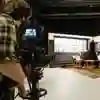
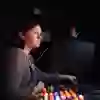
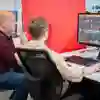

Looking for a more hands-on Media degree? You’ve found it. Gain the creative, technical and collaborative skills you need to break into the media industries.
Master production, planning and post-production skills. Bring your creative ideas to life using cutting-edge filming and editing facilities. And work on group projects with students in game design, music, and drama.
Get the insider's view on the industry. Learn about its opportunities and challenges – and how to navigate them. Then boost your CV with work experience opportunities through our strong industry connection
About this course
Our course blends hands-on and collaborative media production skills with thought-provoking theory. Exactly the knowledge and experience you need for a career in the media industries.
You work across both practical and digital production spaces. Record in our multi-purpose studio. Create digital environments using the Unreal game engine. And develop editing and post-production skills in our industry-standard media labs.
You learn about leadership in the creative industries. Focusing on the creative processes, such as individual and group planning, and safe working practices. As well as key organisational aspects, including diversity, entrepreneurship, and the legal realities.
Screen Yorkshire’s Connected Campus can offer you work experience and masterclasses. We’re also partners with the Northern Media Mentors: a group of media producers and creators. They provide 1-to-1 advice, workshops, and live briefs for you to work on.
Did you know Hull was used for The Crown, Enola Holmes 2, and David Copperfield? Our region is growing in popularity as a film location. And that means even more opportunities to gain real-world experience on top of your degree.
Welcome to Hullywood.
Module options
Each year, you’ll study modules worth a certain number of credits, and you need 120 credits per year. Most modules are 20 credits – so you’ll study six modules each year. Some longer modules, such as a dissertation, are worth more. In these cases, you’ll study fewer modules - but the number of credits will always add up to 120. Some modules are compulsory, some are optional, so you can build a course that’s right for you.
Filters
Screen Storytelling
Learn how structure and style shape film narrative through classroom- and studio-based learning.
compulsory
20 credits
Introduction to Filmmaking
On this hands-on module, we'll introduce you to our extensive technical resources. But more importantly, we'll teach you how to choose the right tool for each job. How to coordinate action and understanding among your whole crew, so you can succeed in the most fundamental filmmaking task: solving creative problems.
You’ll develop your creative practice skills and learn the fundamentals of practical filmmaking. Whether you’re making film or professional online content, understanding established filmmaking techniques and practice are essential for success. We’ll guide you through a range of film production techniques, processes and methods.
So, by the end, you’ll be well prepared to tackle the rest of your degree. But more than that, you’ll have the skills to take your first steps toward becoming an industrial and recognised film professional.
compulsory
20 credits
Introduction to Documentary
Reflect on how filmmakers have tried to capture reality, and plan your own documentary project.
compulsory
20 credits
Exploring Post-production Practices
Develop your understanding of editing and post-production through a series of hands-on exercises.
compulsory
20 credits
Environment Design
This module will introduce the ideas, techniques and working practices to realise complete game ready video game environments. By creating your own game environment, you will explore game engines from an art perspective, how to create game ready assets, learn about lighting principles, texturing, 3D, and develop an understanding f environment art pipelines as well as enhancing your creative thinking skills and problem solving abilities. At the end of the project you will have a piece of work that you can display in your portfolio which will help you on your journey into the gaming industry.
compulsory
20 credits
Visual Design Fundamentals
Get to grips with the fundamentals of visual design, such as composition, colour and typography, which you can apply across media
compulsory
20 credits
Public Service Media
What role do media outlets and media content have to play in the cultivation of informed citizens, equipped to participate in the world around them? And how can media producers play this role in an era of almost infinite choice?
compulsory
20 credits
Intermediate Technique
Develop your skills and understanding in one of the following production areas: scenography; stage management; play and scriptwriting.
compulsory
20 credits
Short Film
How are short films different from feature films, and what kinds of short films gain entry to festivals and win awards? This module explores a range of short films and the contexts in which they circulate.
compulsory
20 credits
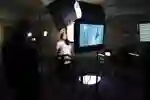
If you could tell one story, what would it be?
Featured module
- optional
- 20 credits
On this module, you’ll get the chance to choose a true story and develop it into an engaging short film.
Documentary storytelling has become an essential part of the British film and television industry. Making documentary skill sets valuable assets for any filmmaker.
With specialised supervision, you’ll find and develop a story that you want to tell. Then you’ll produce documentary to a festival standard in the short space of twelve weeks.
Our facilities
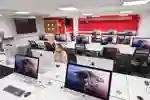

Watchlist
Degrees that live up to life
Course montage
1 min
Dr James McLean
Course overview
2 mins
Life on campus
University life
2 mins
Film and Media Facilities
Course Highlight
2 mins
The Gold Standard for Teaching
University life
1 min
Featured academics
You’ll be taught by enthusiastic, expert staff who are as passionate about their field as they are knowledgeable. With expertise and professional experience spanning a wide range of genres, they bring diverse perspectives and a deep love for their subjects into every class, ensuring an engaging and well-rounded learning experience.

Dr James McLean
Lecturer in Media Production
James teaches media production, drawing from his experience in creative pre-production and production roles across. His research focuses on the processes of media production. He contributes to media projects with visual design and podcast hosting.

Dr Laura Mayne
Lecturer
A film historian who specialises in post-war British cinema, Laura is a published author. She co-wrote Transformation and Tradition in Sixties British Cinema, a reassessment of the nature and significance of British cinema and the film industry.
Entry Requirements
What do I need?
This course is currently available through Clearing, which means our entry requirements are a bit different to what they would normally be.
At Hull, you're a name not a number. During Clearing, we look at all of your qualifications and experience, not just your academic grades. We may be able to offer you a place whatever your situation. Get started by completing our eligibility checker, and find out immediately if you could study at the University of Hull.
Have questions? Our admissions team will be happy to help.
Fees & Funding
How much is it?

Future prospects
You’ll gain the technical, practical, business and personal skills to succeed in the creative industries and beyond. You’ll graduate as a work-ready professional with industry insight.
Our graduates have gone on to become TV and film producers, journalists, marketers, publishers, events managers, PRs and more.
Become part of the next generation of futuremakers
Like what you've seen? Then it's time to apply.
The standard way is to apply through UCAS. This will give you the chance to showcase your skills qualities and passion for the subject, as well as providing us with your academic qualifications.
Not ready to apply yet?
Visit our next Open Day, and see all that the University of Hull has to offer. Talk to our lecturers about your subject, find out what university is really like from our current students, and take a tour of our beautiful campus and amazing facilities.
You may also be interested in...
94% employability (Screen) UK domicile full-time first degree leavers; Higher Education Graduate Outcomes statistics, for the academic year 2022/23, published by the Higher Education Statistics Agency June 2025.
Media Studies: Ranked 7th for learning resources. National Student Survey (NSS) 2025, HEIs only.
Media Production: Ranked 10th in the UK for Teaching Quality. The Times and Sunday Times Good University Guide 2026.
All modules on this course page are subject to availability and this list may change at any time.